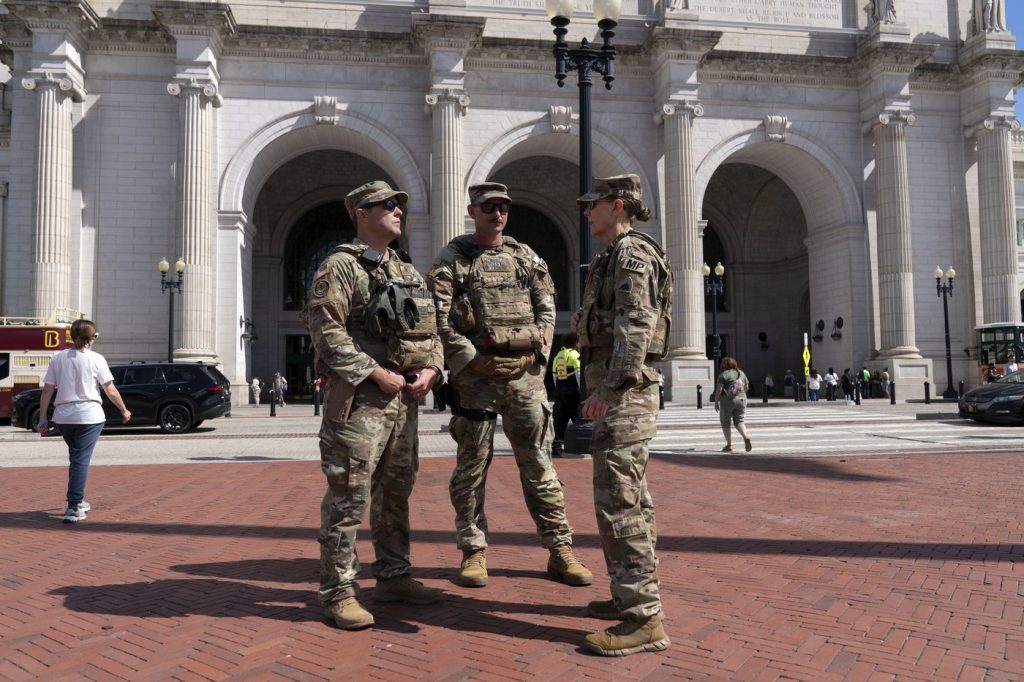On a humid early September afternoon in Washington, D.C., the presence of National Guard troops at the entrance of the city’s widely recognized Union Station drew curiosity from both tourists and office workers. Tourists pulled suitcases, while hurried office employees navigated around the stationed soldiers. The scene unfolded differently than what many Americans had expected just weeks earlier, as experts warned that this troop deployment could foreshadow national trends under President Donald Trump’s administration.
Since August 11, 2025, the National Guard has maintained a presence in the city following Trump’s declaration of a state of emergency due to rising crime rates. This emergency declaration is scheduled to lapse on September 10, unless Congress intervenes to extend it. As the situation develops, the future of the National Guard’s presence in Washington remains uncertain. While Congress seems poised to refrain from voting on an extension, Trump has signaled a desire to prolong the troops’ stay.
Criticism has been rampant from local residents, many of whom note that the National Guard’s activities predominantly take place in tourist zones and public transit areas. Observers have frequently witnessed troops appearing disengaged, often using their phones, and wandering through the streets. This deployment is reported to be costing American taxpayers approximately $1 million per day, further exacerbating feelings of frustration among locals.
Locals are voicing their displeasure not just at the troop presence but at what they see as Trump’s infringement on the District of Columbia’s limited autonomy. Numerous “Free D.C.” signs have surfaced throughout the city, accompanied by regular protests against the military deployment. In response, the District of Columbia filed a lawsuit against the Trump administration, contending that the deployment constitutes an illegal utilization of military forces for domestic law enforcement. Brian Schwalb, the district’s elected attorney general, stressed that no American jurisdiction should endure compulsory military occupation.
The involvement of military forces in domestic policing has a contentious history in the U.S., governed by the Posse Comitatus Act, which prohibits unauthorized federal military involvement in law enforcement. Historical precedents exist for federalizing the National Guard during crises, such as Hurricane Katrina in 2005 and the 1992 Rodney King riots, but instances of such actions occurring against a governor’s wishes are exceedingly rare. Law professor Aziz Huq notes that Trump’s current troop deployment raises numerous complex legal questions regarding federal authority and military engagement in the U.S.
In a recent ruling, U.S. District Judge Charles Breyer determined that Trump’s administration acted unlawfully by deploying the National Guard to Los Angeles during protests over immigration raids. In light of Trump’s ongoing assertions of deploying troops to additional cities, concerns arise over the establishment of what could be perceived as a national police force under presidential command.
Trump’s approach to sending troops has met resistance from local leaders, including Illinois Governor JB Pritzker, who labeled the president’s statements “unhinged” after declining an offer for troops in Chicago. In addition to Chicago, Trump has made suggestions about sending troops to Baltimore, which has faced opposition from both its mayor and the state’s governor.
Experts predict that if Trump proceeds with deploying troops to these urban areas, his administration could justify such actions as necessary for enforcing federal law, potentially lowering legal thresholds for future military mobilizations. Concerns arise that such judicial rulings might create a precedent for increasingly authoritarian military interventions.
Outside of Union Station, a group of veterans gathered beneath a tent, rallying against what they perceive as “creeping authoritarianism” in the United States. Activist Lelaina Brandt expressed fears that this development signifies a gradual conditioning of the public to accept armed military personnel patrolling urban streets. Political-science professor Matthew Lebo echoed similar sentiments, cautioning that while the troops’ activities may seem benign, their presence remains fundamentally intimidating. He emphasized that Americans should not have to accept such authoritarian measures in exchange for the promise of reduced crime rates.











